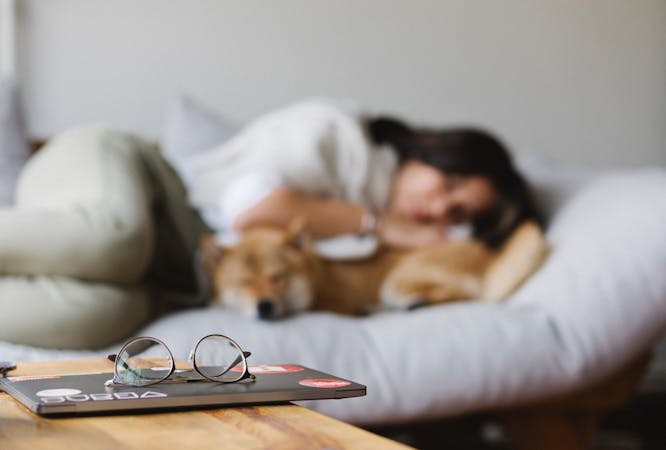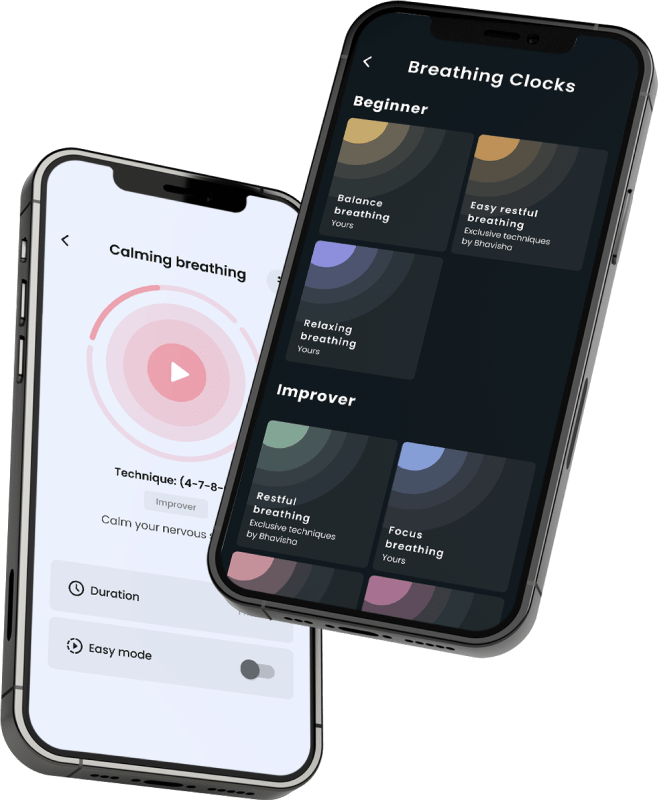Why Do I Sleep Better on the Couch than in Bed?

Sleeping on the couch is something we all end up doing at times. Sometimes an argument with a partner left us wanting some space, or perhaps we simply felt exhausted and ultra-cosy in the living room. However, for some of us, it is always much easier to fall asleep on a couch than in bed. While the bedroom may have the most purpose-built environment for sleeping, we can often find ourselves suddenly staring wide-eyed once we're tucked up in bed. Here, we will delve into the psychology of rest to find clues about why this phenomenon occurs.
Common Causes of Sleeping Difficulties
Sleeping difficulties in general have a wide variety of causes. While some are unavoidable, others can be tweaked to ensure a better night's rest.
Physical
Many physical problems can interfere with sleep, from temporary illnesses such as the flu to long-term health issues such as asthma or acid reflux. Sometimes, bedtime is when certain health issues flare up. For example, for people with allergies, skin rashes may be most irritating at night due to the heightened histamine response in the body at this time.
Psychological
Often, psychological issues such as anxiety and depression interrupt the circadian rhythm. This sometimes leads to late nights as well as under- or over-sleeping. For some, the nighttime hours are particularly difficult as there are no longer ample distractions from negative thoughts available. For others, nighttime is the only time when they feel true peace, in solitude.
Lifestyle
Lifestyle includes choices, such as our daily habits, as well as certain things that are not so much in our control, such as unexpected career demands. Certain choices such as watching TV in bed or having too much artificial light in the bedroom can lead to insomnia. This is due to the mentally arousing effects of both conditions. Other lifestyle factors such as shift work are renowned for causing issues with maintaining a healthy circadian rhythm.
Medications and Substances
A number of medications interrupt sleep, including SSRIs (a type of antidepressant), heart medications, and even some cold remedies. Of course, caffeine and alcohol are well-known to interfere with sleep quality, but some people are unaware that caffeine is present in many foods and beverages. This includes chocolate, chewing gums, and even "decaffeinated" coffee!
Age
Throughout our lives, our sleep patterns change massively. Young children require immense amounts of sleep compared with adults.
Teenagers and young adults often have trouble falling asleep early and keeping an early morning routine due to a shift in their circadian rhythm around that time of life. This can lead to overwhelming fatigue throughout the day.
Furthermore, people aged 60 and over are more susceptible to certain sleep issues, including insomnia and restless leg syndrome. According to sleepfoundation.org, this can be partly attributed to the psychological changes we go through as we age. Older people are also at a higher risk of certain physical problems that can interfere with getting a good night's sleep.
Could I have a Sleep Disorder?
For some people, having trouble getting to sleep in the bedroom can be due to an unknown sleep disorder. Some people feel soothed to sleep whilst doing things such as watching television but once they get into the bedroom they feel wide awake. This form of insomnia can sometimes be due to anxiety - if a person often worries once they have no more distractions, this can create an association between the bedroom and anxiety, thus wakefulness.
How Common are Sleep Disorders?
Sleep disorders are incredibly common. About 50 to 70 million adults in the US report having sleep issues, with the main problem reported being insomnia. In the UK, the NHS reports that around 1 in 3 people suffer from insomnia alone, with elderly people being particularly affected.
What are the Main Types of Sleep Disorder?
It is reported there are around 80 types of sleep disorder currently identified, though some sources report there to be over 100. The most commonly occurring are insomnia, sleep apnoea, restless leg syndrome, night terrors, and narcolepsy.
Do Sleep Disorders Make it Easier to Fall Asleep on the Couch?
This depends greatly on the individual and their condition, as well as the layout of their home. Sometimes a sleep disorder can cause a person to dread going into sleep mode, which can lead to avoidant behaviours such as regular late nights. Other times, disruptions to a circadian rhythm may cause a person to sleep on the couch at random hours.
Why is it easier for me to fall asleep on the couch?
There are a variety of factors that can make sleeping on the couch a regular habit. Generally, they tend to be environmental or physical:
Environmental Factors
For those who are often bed-sharing, there can be all kinds of interruptions to sleep caused by the other person. These include snoring, not getting enough space, and the relationship with that person not being on good terms at a particular time.
The term "sleep hygiene" refers to the way a person can positively impact their sleep quality by making certain lifestyle and environmental choices. Good sleep hygiene includes sticking to a relaxing bedtime routine without too much blue light. It also involves exercise and dietary choices, as it is the best idea to avoid strenuous exercise, spicy food, alcohol, or caffeine, in the hours running up to sleeping.
Physical Factors
There are many physical conditions that can impact our sleep experience. Some chronic conditions can impact sleep so much that a person's quality of life is greatly compromised.
Conditions such as GERD (gastroesophageal reflux disease) cause a person to experience sudden pain when lying flat. GERD involves stomach acid rising up through the oesophagus suddenly, which can also be dangerous for a sleeping person as it presents a choking hazard.
With certain conditions such as this, it is recommended to take on a slightly elevated sleeping position, either using pillows or an adjustable bed. If a person unknowingly suffers from a medical condition requiring them to elevate their head and chest, it is feasible that they may naturally gravitate towards falling asleep on the couch rather than in bed.
People suffering from other conditions such as sleep apnoea and asthma gain the same benefits from a raised sleeping position.
Some of the many other examples of chronic medical conditions that stop us from getting enough sleep include overactive thyroid, Parkinson's disease, Alzheimer's disease, cancer, heart disease, chronic pain, and diabetes. About 15 million people in the UK and more than 133 million Americans suffer from chronic illness, making them much more susceptible to sleeping issues as a result.
Sometimes, short-term or irregularly recurring conditions can equally create an uncomfortable sleeping environment.
Why Can't I Get Comfortable in My Bed Any More?
For many people, it feels impossible to sleep comfortably from time to time. As discussed throughout this article, this can be down to psychological causes, undiagnosed sleep problems, environmental, or physical issues.
Couch sleeping can arise due to psychological cues in the living room- perhaps this space reminds us of relaxing activities, whereas the bedroom may remind us of worrying about the day to come. There is also a chance that the multiple distractions in the living room help to quieten mental chatter and soothe an anxious person to sleep. It is also possible that working in the bedroom or performing other stressful activities in that space causes a feeling of unease at night.
However, for other people, physical causes may result in better sleep on the sofa. For those of us who have chronic pain, sleeping on a couch can alleviate the symptoms. Anything from neck pain to difficulty breathing can make bedtime a nightmare for some. The elevated back position or different level of firmness in a sofa can make a world of difference.
Is it OK to sleep on a couch every night?
We've pretty much all experienced an overnight journey or had to sleep somewhere that could not be classified as a bed. Nights such as these leave us stiff and sore the next day, which impacts our mental wellbeing too. Sleeping on a couch every night leaves little room for manoeuvring at times when we need to stretch or turn over. Often, we have difficulty staying asleep on the sofa due to this discomfort. If we need to move to a different room in the middle of the night, this can disrupt our sleep further.
How can I get better sleep?
Physical Changes
The primary mode of action should always be to consult a doctor in cases where physical illness or injury is causing trouble sleeping. Changing certain things such as your sleep posture, mattress, or pillow can give you much better sleep.
For example, a "cervical pillow" moulds to the shape of the neck and head, providing balanced support to reduce neck pain. Furthermore, if looking for a new mattress, take into consideration the softness. If a mattress is too soft, it can cause sinking while you sleep and give you back pain. However, if it is too hard it can restrict blood flow. Choose a mattress based on your individual problems and needs.
Finally, if there isn't enough space in bed with your partner, consider buying a larger bed or sleeping in separate beds. This may require some awkward negotiation with your partner, but it can be especially helpful in cases of back pain or pinched nerves.
Psychological Help
With problems such as nightmares or nighttime anxiety, it is essential to consider the benefits of relaxation in the hours leading up to sleeping. This doesn't simply mean watching netflix for 3 hours! Instead, focus on conscious relaxation techniques such as restorative yoga or guided meditation.
By putting a little "effort" into self-care, we can also boost our confidence and ability to self-regulate. This in turn can help us to gain control over any psychological issues that are getting in the way of our best sleep.
Of course, psychological causes of sleep issues are best solved by consulting a professional. Consider whether the sleep issue is a signifier that deeper-rooted issues are at play. Sometimes the best course of action is to seek therapy.
Environmental Changes
Sadly, we can't always control our environment when it comes to sleeping. For city-dwellers, too much light or noise can prevent you from feeling sleepy when you settle down. Consider using blackout curtains or a white noise machine to neutralise any distracting stimuli.
A huge variety of environmental factors can wake us up... snoring partners, crying kids, noisy neighbours. Sometimes, we can end up sleeping on the sofa outside of bedtime through pure exhaustion. Be sure to note how often you feel sleepy during the day and see if there are any compromises that can be made regarding work, housework, or childcare.
Couch sleeping can be a sign of many things, so it is best to pay close attention to your own lifestyle and rhythm. Keep notes of what feels uncomfortable around bedtime and take steps to modify your routine.

